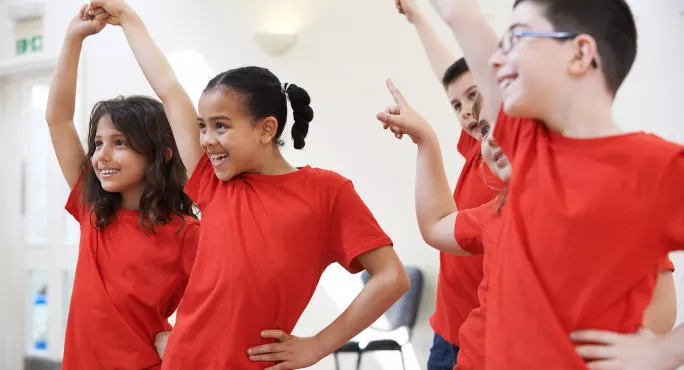Primary teachers urged to explore ‘wonder of dance’

Dance is largely “unexplored” in primary schools even though it is a form of learning that offers “something for everyone”, new research finds.
The report from the Royal Conservatoire of Scotland calls for a national campaign to raise awareness of the potential of dance in primary schools.
It also recommends a national support network to build teachers’ confidence with dance and pilot projects that would fuel more opportunities for student teachers to bring dance into primary schools.
- Related: My daughter just wants to dance, so what’s stopping her?
- WATCH: The school where social dance became cool
- Strictly come teaching: Three ways dance can boost learning
- Quick read: Why PE should be full of dance
The report Dance Education in the Primary School in Scotland, by arts education experts Eilidh Slattery and Andrew Rae, states that “the potential of dance appears to remain unexplored within the primary school”.
It adds: “The many factors explored in this study point to what could be described as an acceptable norm within education in Scotland that it is OK not to deliver learning experiences in this area of the curriculum. But as one of our respondents states, ‘we are depriving pupils of opportunities’ to explore the wonder of dance in the primary school.”
The power of dance in primary schools
The researchers, whose work included surveying 211 teachers, say their recommendations are “achievable and impactful” and will lead to “transformative change for the position of dance in the primary school”, but “will take time”.
They make three recommendations, including:
- “A national campaign to raise awareness of the value and inclusive nature of learning in, about and through dance in the primary school.”
- A “national support network” for teachers, student teachers and initial teacher education (ITE) universities, with “evidence-informed information, ideas and advice” on dance.
- Pilot studies in primary schools to share “experiences and practice as well as to add pupils’ voices to the discussion”, and studies involving primary schools and ITE programmes to “boost opportunities for student teachers to see and experience the teaching of dance in our primary schools”.
The report states: “Dance is such a powerful, free-flowing expression of human emotion with so many positive benefits. Not only is dance good for our physical health, research also shows the positive impact it can have on our mental wellbeing, too.”
It adds: “Dance is accessible and, in its simplest forms, requires minimal, even no, equipment. Dance, then, is and should be for everyone, especially primary school children, who have so much potential to gain so many important life skills from expressive arts engagement.
“Dance and creative movement can provide such important benefits to children’s development, can support subject-specific growth, as well as being excellent vehicles for supporting learning across all areas of the curriculum. Importantly, dance can also be joyful, liberating and fun.”
The report also stresses that dance already has a firm foothold in the expressive arts area of Scotland’s Curriculum for Excellence, with its own “experiences and outcomes signalling the artistic, expressive and creative possibilities of the art form”.
But dance can also be “delivered and enjoyed as part of physical education” in the health and wellbeing area of CfE.
Previous UK and international research has highlighted several problematic issues for dance in primary schools, including: teachers’ limited experience of dance; misconceptions around dance; teachers’ own confidence and ability to teach dance; and lack of time in a busy curriculum.
The Royal Conservatoire of Scotland researchers state: “Teachers’ confidence with dance impacts how often children get to experience learning in, about and through dance and creative movement.
“For dance education to be inclusive and accessible for every child, dance education for teachers needs to be inclusive and accessible for all primary teachers and not solely reliant on the prior knowledge and experience in dance experienced by some individuals.”
The researchers asked the nine Scottish ITE universities for information on dance-specific content in their programmes. They found a “lack of parity of experience for our newly qualified primary teachers”, with three institutions providing “no ITE course content relating to dance at either undergraduate or postgraduate level”.
Lead researcher Ms Slattery told Tes Scotland: “This research report is very much a starting point. It was important to find out what is happening with dance in primary schools in Scotland to have a clear picture.
“Now the focus moves to celebrating and sharing the learning and joy that dance is bringing and also using what we’ve learned about the challenges when it comes to dance in school and looking at how to support teachers who wish to develop this aspect of their practice.”
You need a Tes subscription to read this article
Subscribe now to read this article and get other subscriber-only content:
- Unlimited access to all Tes magazine content
- Exclusive subscriber-only stories
- Award-winning email newsletters
Already a subscriber? Log in
You need a subscription to read this article
Subscribe now to read this article and get other subscriber-only content, including:
- Unlimited access to all Tes magazine content
- Exclusive subscriber-only stories
- Award-winning email newsletters
topics in this article



